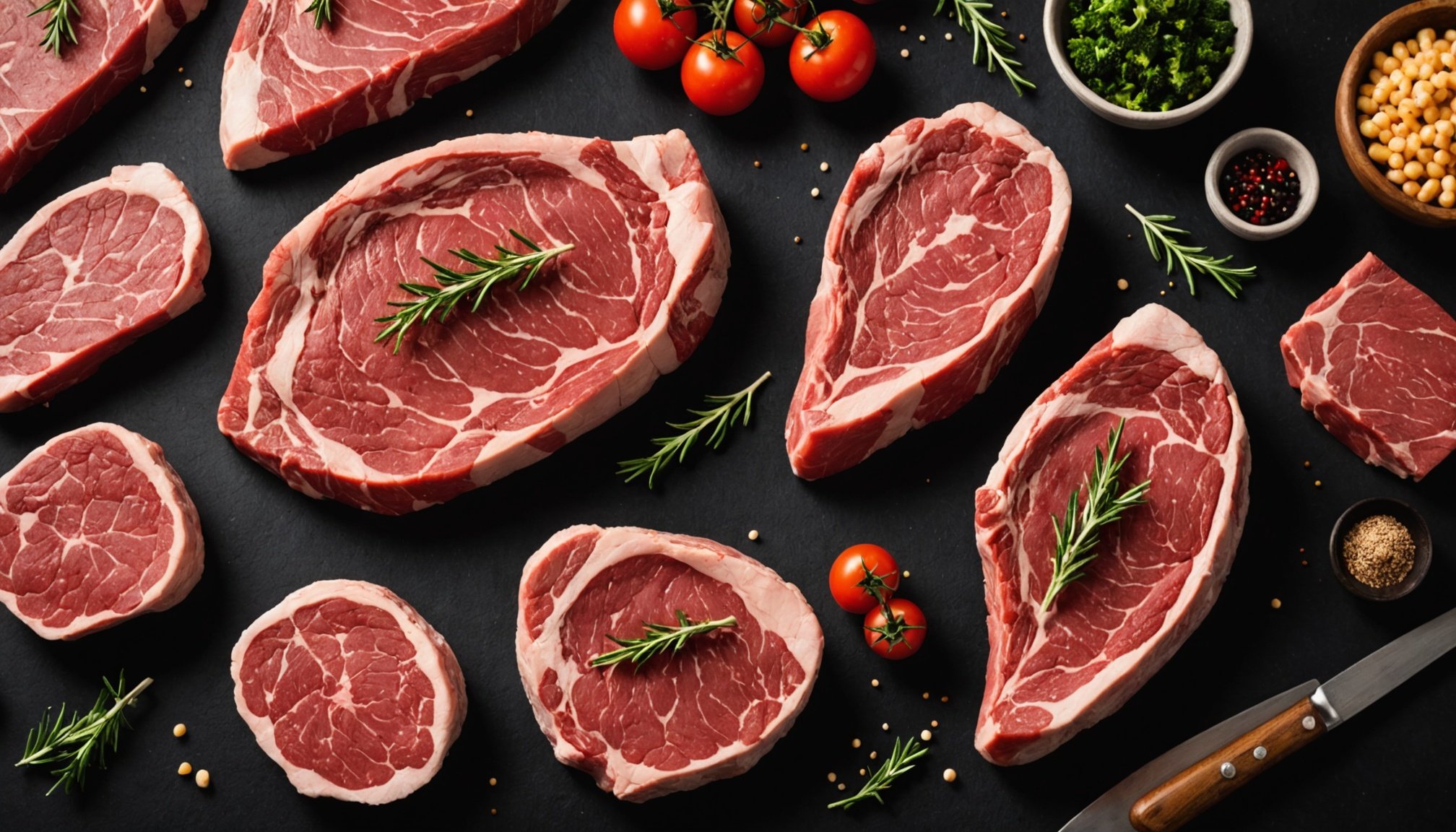Selecting the right premium meat supplier is vital for the success of your steakhouse. Quality cuts can elevate your menu and enhance customer satisfaction. This process involves understanding your specific needs, vetting suppliers, and evaluating their practices. Knowledge about sourcing, production, and sustainability trends can provide a competitive edge. Explore strategies to choose a supplier that aligns with your vision and delivers exceptional meat that will leave a lasting impression on your diners.
Understanding the Importance of Quality Meat Suppliers
Exploring the essentials of meat supplier qualities.
Additional reading : Enhancing restaurant ambiance: innovative ways to incorporate acoustic panels for a stylish dining experience
The Impact of Meat Quality on Customer Satisfaction
Quality meat suppliers are pivotal in ensuring customer satisfaction. Customers often judge a restaurant by the quality of its meat, making it essential for establishments to partner with suppliers who can consistently deliver premium products. High-quality meat not only enhances the taste but also meets health standards, ensuring a positive dining experience.
How Quality Influences Restaurant Reputation
A restaurant's reputation is closely tied to the consistency and quality of the meat it serves. Patrons are more likely to return to and recommend restaurants that offer consistently high-quality dishes. This reputation hinges on reliable suppliers who understand the importance of maintaining standards. A single lapse in meat quality can lead to negative reviews, impacting the business's credibility.
Also to discover : Discover the benefits of adding organic ingredients to elevate your restaurant menu
The Role of Suppliers in Maintaining Consistent Quality
Suppliers play a crucial role in maintaining a restaurant's quality standards. They must adhere to strict sourcing and processing protocols to ensure the meat meets the necessary specifications. By choosing the right meat suppliers, restaurants can ensure they receive products that align with their brand values and customer expectations.
- Essential Qualities of a Meat Supplier:
- Reliability in delivery
- Consistency in product quality
- Commitment to sustainable practices
Key Quality Standards for Meat
Understanding what defines superior meat quality.
Understanding USDA Grades
The USDA grades are a critical benchmark in assessing meat quality standards. These grades, such as Prime, Choice, and Select, provide a reliable guide for evaluating the tenderness, juiciness, and flavor of meat. Restaurants seeking to maintain high standards must understand these classifications to ensure they select the best products for their menus.
Importance of Farm-to-Table Quality Assurance
Farm-to-table quality assurance is essential in upholding meat quality standards. This approach involves tracing the meat's journey from the farm to the consumer's plate, ensuring all processes meet rigorous criteria. Such transparency not only guarantees freshness but also builds trust with customers who value sustainable and ethical sourcing.
Role of Aging and Butchering Practices
Proper aging and butchering practices significantly influence meat quality standards. Aging, whether wet or dry, enhances flavor and tenderness, while skilled butchering ensures optimal cuts. For example, dry-aged beef is often preferred for its rich taste and texture. These practices highlight the importance of expertise in maintaining the highest quality standards.
- Key Factors in Meat Quality:
- USDA grading
- Farm-to-table assurance
- Aging techniques
- Butchering skills
Certifications and Compliance
Exploring the certifications that uphold meat quality and safety.
Overview of Relevant Certifications
Meat supplier certifications are essential in establishing trust and ensuring compliance with industry standards. Notable certifications include the USDA and GAP (Good Agricultural Practices), which verify adherence to stringent quality and safety protocols. These certifications assess factors such as animal welfare, environmental impact, and food safety, playing a pivotal role in maintaining high-quality standards.
Importance of Food Safety Standards
Food safety standards are crucial for protecting consumers and maintaining the integrity of the food supply chain. Certifications like the USDA ensure that meat products are free from contaminants and meet health regulations. By adhering to these standards, suppliers demonstrate their commitment to food safety, which is a significant factor in consumer decision-making.
How Certifications Influence Consumer Trust
Certifications significantly influence consumer trust, as they provide assurance of quality and safety. When consumers see labels such as USDA or GAP, they are more likely to trust the product and the supplier. This trust is vital for building long-term relationships with customers and enhancing a brand's reputation.
- Key Certifications:
- USDA
- GAP
- HACCP (Hazard Analysis Critical Control Point)
Sourcing Practices to Consider
Exploring sustainable meat sourcing for better quality and ethics.
Benefits of Local vs. National Suppliers
Choosing between local and national suppliers can significantly impact a restaurant's sustainability efforts. Local suppliers often provide fresher products with a reduced carbon footprint due to shorter transportation distances. This not only supports the local economy but also aligns with sustainable meat sourcing principles. Conversely, national suppliers may offer a broader variety of meats and potentially more competitive pricing but at the cost of higher environmental impact.
Understanding Ethical Sourcing and Its Impact
Ethical sourcing is essential in today's conscious consumer market. It involves ensuring that the meat is produced in a way that respects animal welfare, workers' rights, and environmental considerations. By prioritizing ethical sourcing, businesses can enhance their brand reputation and appeal to discerning customers who value sustainability. This practice is a cornerstone of sustainable meat sourcing, promoting long-term ecological balance and social responsibility.
The Importance of Traceability in Meat Sourcing
Traceability is crucial in maintaining transparency and trust within the supply chain. It allows businesses to verify the origin and handling of their products, ensuring compliance with sustainable meat sourcing standards. This transparency is vital for addressing consumer concerns about food safety and ethical practices.
- Key Considerations:
- Local vs. national benefits
- Ethical sourcing impacts
- Traceability importance
Pricing Structures and Models
Exploring how pricing strategies affect meat supplier choices.
Understanding Price Per Pound vs. Bulk Pricing
When evaluating meat supplier pricing, understanding the difference between price per pound and bulk pricing is crucial. Price per pound offers flexibility, allowing restaurants to order specific quantities as needed. However, bulk pricing often provides cost savings, making it an attractive option for establishments with consistent demand. This choice depends on the restaurant's purchasing strategy and storage capacity.
Factors Affecting Pricing in Premium Meat Supply
Several factors influence meat supplier pricing in the premium segment. These include the quality of the meat, seasonal availability, and the supplier's reputation. For instance, premium cuts like Wagyu or organic meats command higher prices due to their superior quality and ethical sourcing. Additionally, market demand and transportation costs can fluctuate, affecting overall pricing structures.
Evaluating the Cost-Benefit Relationship
Understanding the cost-benefit relationship is essential when considering meat supplier pricing. While premium meats may come with a higher price tag, they often enhance the dining experience, leading to increased customer satisfaction and loyalty. Evaluating this relationship helps restaurants balance quality and cost effectively.
- Key Pricing Considerations:
- Price per pound vs. bulk pricing
- Quality and seasonal availability
- Cost-benefit analysis
Customer Service and Support
Exploring the critical role of customer service in meat supply.
Importance of Supplier Responsiveness and Reliability
In the realm of meat supplier customer service, responsiveness and reliability are paramount. A supplier's ability to promptly address inquiries and resolve issues can significantly impact a restaurant's operations. Reliable suppliers ensure that orders are fulfilled accurately and on time, minimizing disruptions in service. This reliability builds trust and fosters long-term partnerships.
Evaluating the Supplier's Communication Practices
Effective communication is a cornerstone of excellent meat supplier customer service. Suppliers should maintain clear and open lines of communication, providing updates on order status and potential delays. Regular check-ins and feedback channels are vital for aligning expectations and addressing concerns.
- Key Communication Practices:
- Timely responses
- Regular updates
- Open feedback channels
The Role of Customer Service in Crisis Management
In times of crisis, robust meat supplier customer service becomes even more critical. Suppliers must be equipped to manage unforeseen challenges, such as supply chain disruptions or product recalls. Their ability to provide swift, effective solutions can mitigate potential impacts on the restaurant, ensuring continuity and safeguarding reputation.
Thus, strong customer service is not just a support function but a strategic asset in maintaining operational excellence.
Logistics and Delivery Considerations
Exploring the intricacies of meat supplier logistics.
Importance of Timely Delivery for Freshness
Timely delivery is crucial in maintaining the freshness and quality of meat products. Restaurants rely on suppliers to ensure that meat arrives in optimal condition, directly impacting the dining experience. A delay in logistics can compromise freshness, leading to potential waste and dissatisfaction. Therefore, evaluating a supplier's ability to meet delivery schedules is essential.
Evaluating Transportation Methods and Conditions
Understanding the transportation methods and conditions employed by a meat supplier is vital. Proper refrigeration and handling during transit are necessary to preserve meat quality. Suppliers should utilize advanced logistics systems to monitor temperature and humidity, ensuring compliance with safety standards. This evaluation helps in selecting suppliers who prioritize product integrity.
How to Assess Supplier’s Logistical Capabilities
Assessing a supplier’s logistical capabilities involves examining their infrastructure and processes. Key aspects include their fleet management, route optimization, and contingency plans for emergencies. A reliable supplier will have robust systems in place to handle unforeseen challenges, such as traffic delays or equipment failures.
- Key Assessment Criteria:
- Fleet and route management
- Refrigeration and handling
- Contingency planning
By focusing on these logistical aspects, restaurants can ensure a seamless supply chain that supports their operational needs.
Gathering Testimonials and References
Exploring the value of feedback in selecting meat suppliers.
How to Request and Evaluate References
When choosing a meat supplier, requesting and evaluating references is a crucial step. Start by asking suppliers for contact information of current clients who can vouch for their service quality. Pay attention to the consistency of positive feedback and any recurring issues mentioned. Evaluating these references helps in understanding the supplier's reliability and product quality.
Importance of Peer Recommendations
Peer recommendations play a significant role in the meat supplier selection process. Hearing firsthand experiences from other businesses, especially those with similar needs, provides valuable insights. Recommendations from trusted peers can help identify suppliers with proven track records, reducing the risk of potential issues.
Case Studies of Successful Partnerships
Examining case studies of successful partnerships can offer practical examples of what to expect from a meat supplier. For instance, a well-known steakhouse might highlight how a particular supplier's consistent quality and timely delivery have contributed to their success. These examples serve as testimonials to the supplier's capabilities.
- Key Considerations:
- Request detailed references
- Value peer recommendations
- Analyze partnership case studies
By focusing on these elements, businesses can make informed decisions when selecting a meat supplier.
Comparing Multiple Suppliers
Analyzing the nuances of choosing the right supplier.
Creating a Comparative Evaluation Matrix
When comparing meat suppliers, a well-structured evaluation matrix is invaluable. This matrix enables businesses to systematically assess various aspects of each supplier. Consider factors such as pricing, quality, delivery reliability, and customer service. By scoring each supplier against these criteria, restaurants can objectively determine which supplier best aligns with their needs.
Key Factors to Consider
In the process of comparing meat suppliers, it's essential to focus on key factors that impact decision-making. These include:
- Quality of meat
- Pricing structures
- Delivery performance
- Customer service responsiveness
Each of these elements plays a critical role in ensuring the supplier can meet the restaurant's standards and expectations.
Importance of Trial Orders and Sampling
Trial orders and sampling are crucial when comparing meat suppliers. These practices allow businesses to experience firsthand the quality and service level of potential suppliers. By conducting trial orders, restaurants can verify the consistency and quality of the meat, ensuring it meets their standards before committing to a long-term partnership. This step is a practical approach to minimizing risks and making informed decisions.
Making the Final Decision
Strategies for selecting a meat supplier effectively.
Balancing Quality, Price, and Service
Selecting a meat supplier involves a careful balance between quality, price, and service. Restaurants must evaluate how each supplier meets these criteria to ensure they align with their operational needs. For instance, a supplier offering premium quality meat at competitive prices, but lacking in customer service, might not be the best fit. Conversely, a supplier with excellent service but higher costs could be justified if the quality is unparalleled.
Importance of Building Long-term Relationships
Establishing long-term relationships with suppliers is crucial for consistent quality and reliability. These relationships foster trust and mutual understanding, enabling smoother negotiations and better service. A strong partnership can also lead to exclusive deals, priority service, and insights into market trends, all of which are beneficial when selecting a meat supplier.
Strategies for Negotiating Terms and Conditions
Effective negotiation is key in selecting a meat supplier. Focus on clear communication of expectations and willingness to compromise on certain terms. Consider creating a comparative evaluation matrix to identify the best offers. Additionally, trial orders can serve as a negotiation tool, allowing both parties to assess compatibility before finalizing agreements.
- Key Negotiation Points:
- Pricing flexibility
- Delivery terms
- Quality assurances













